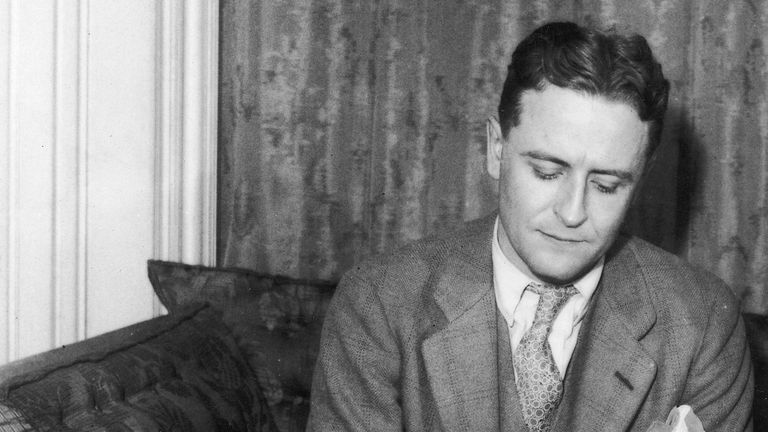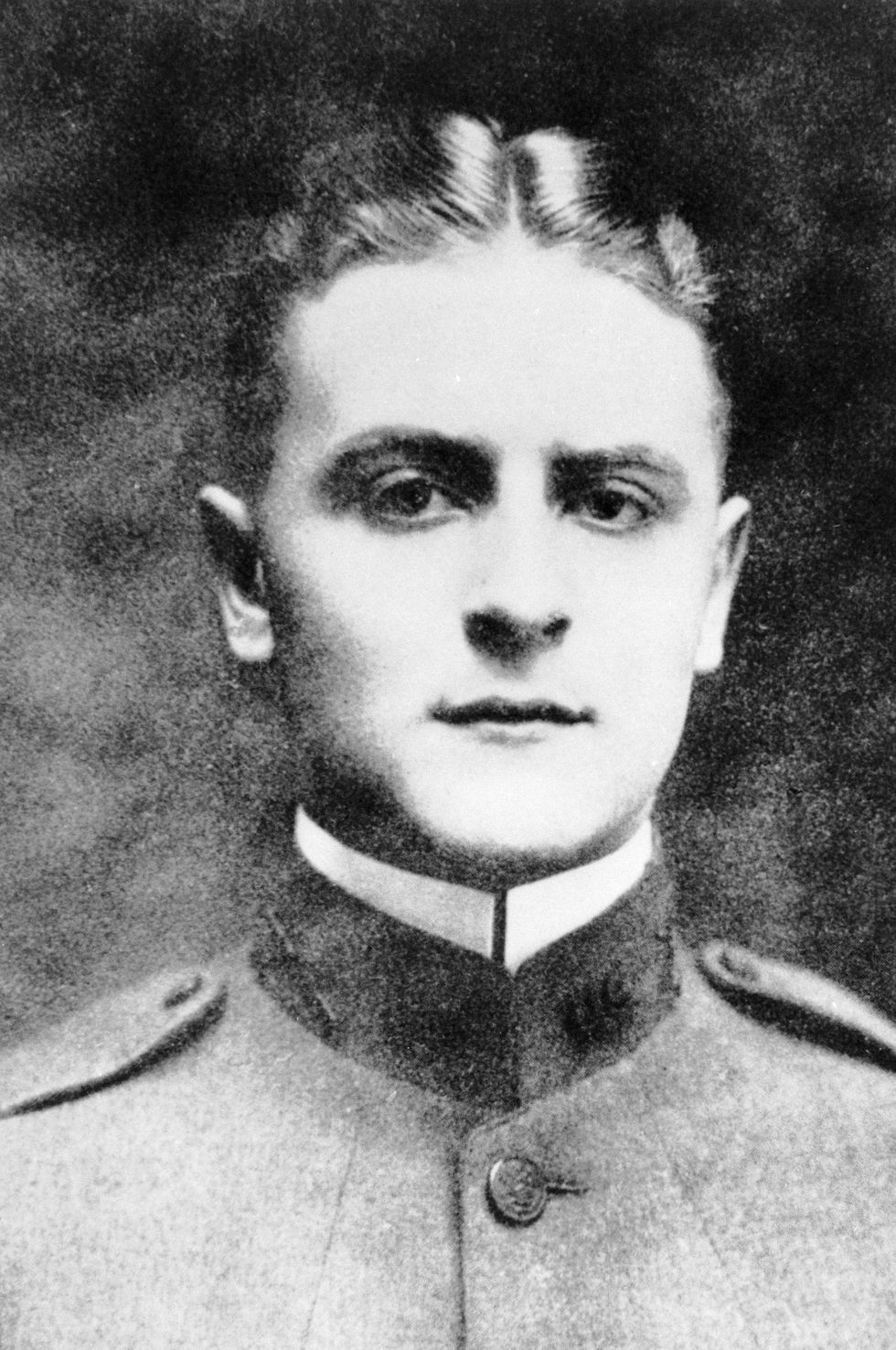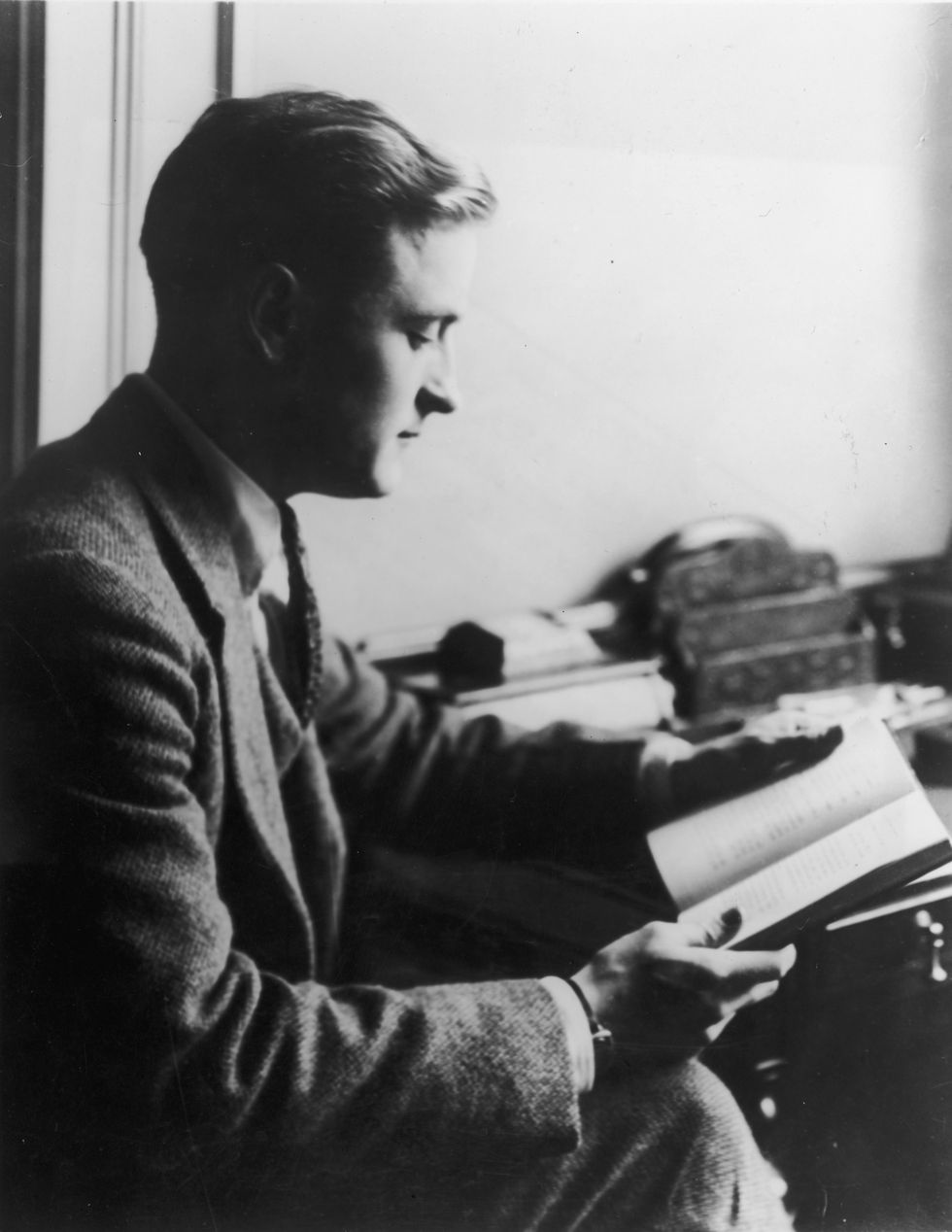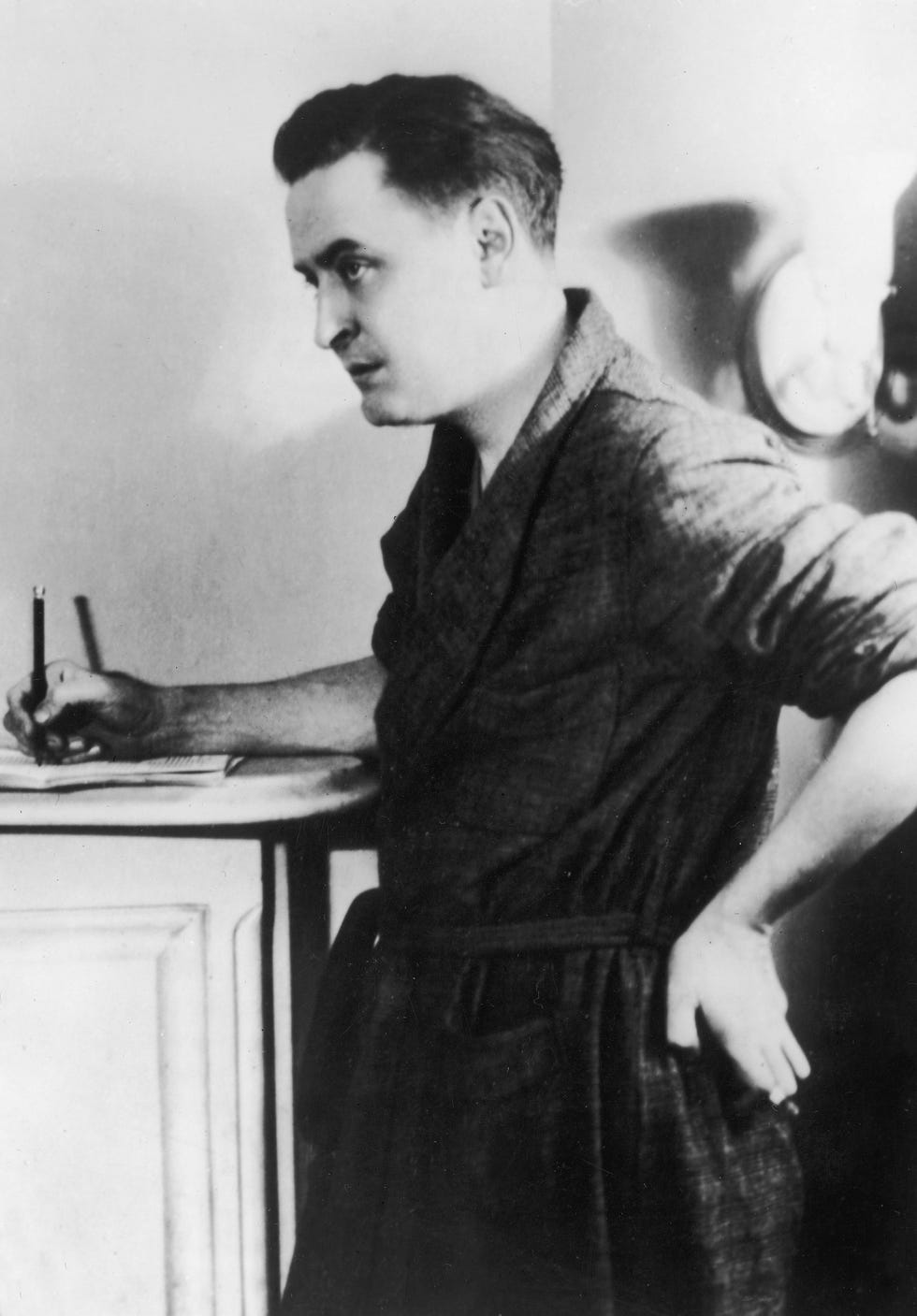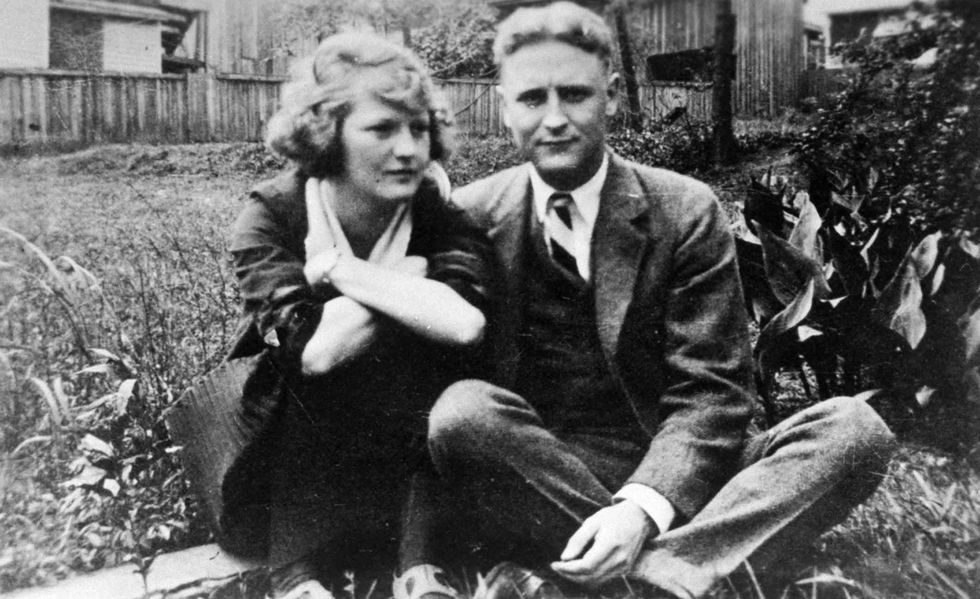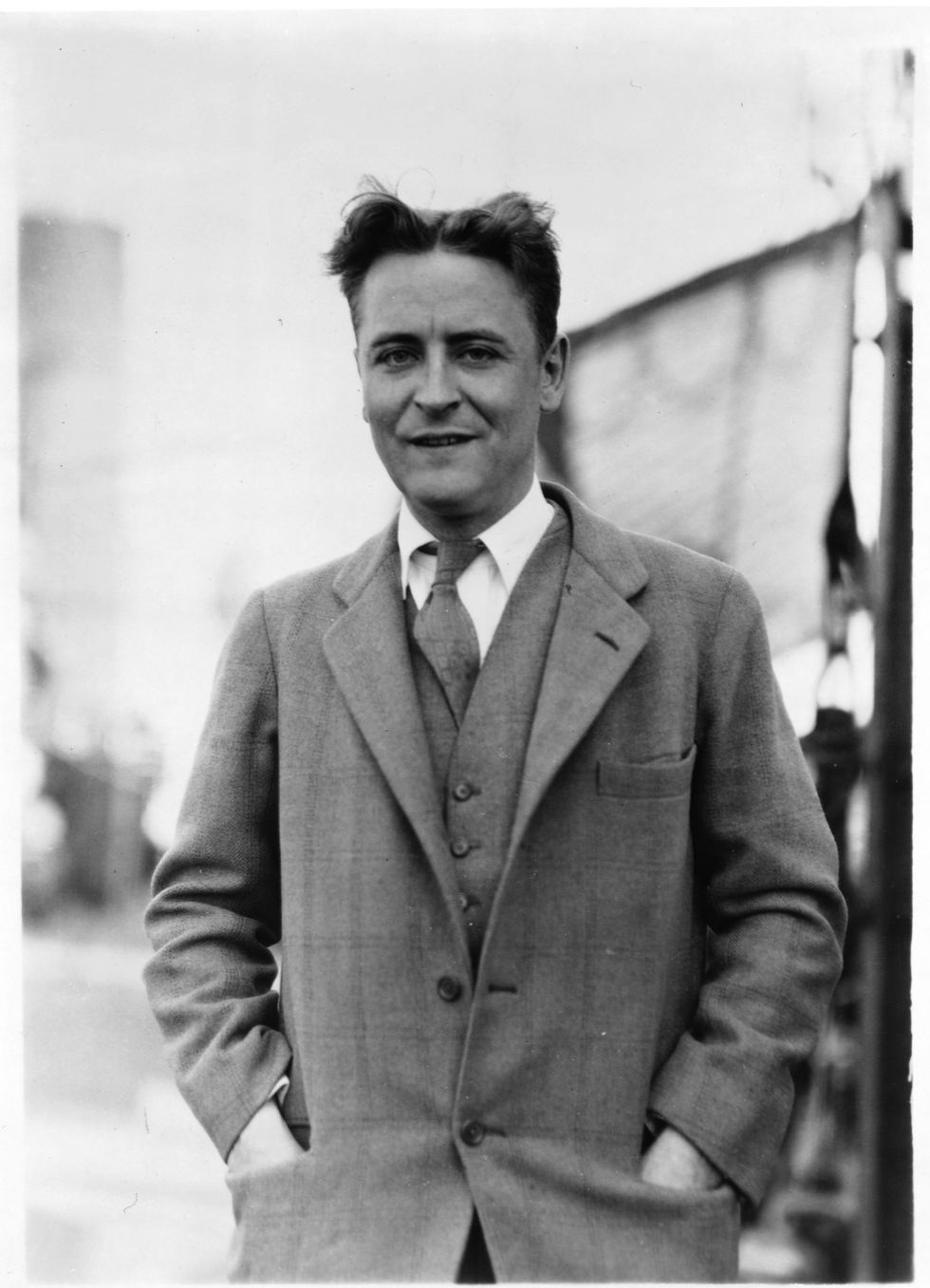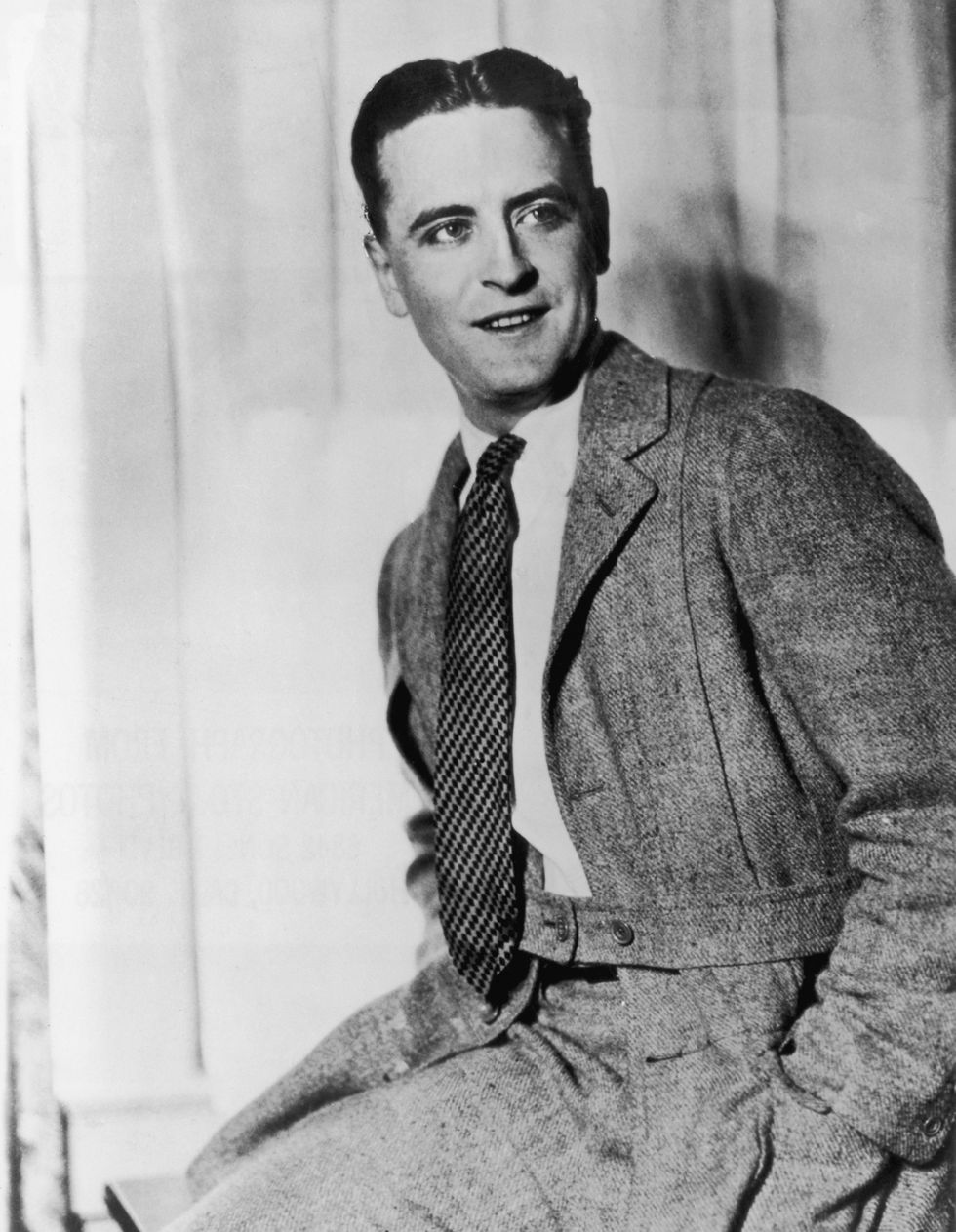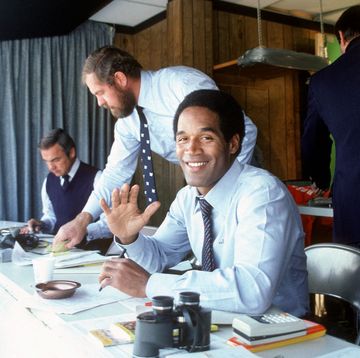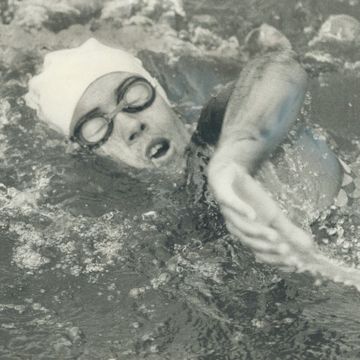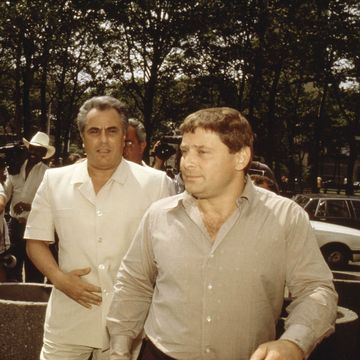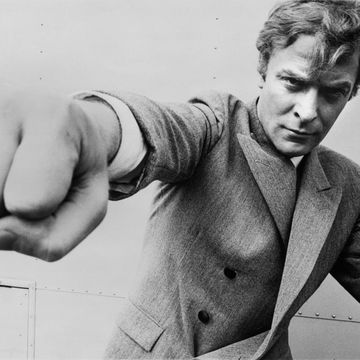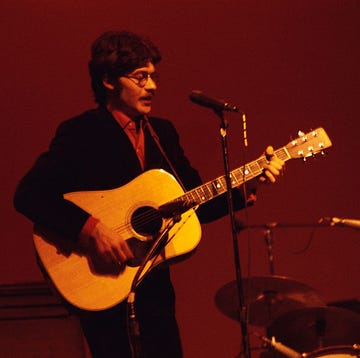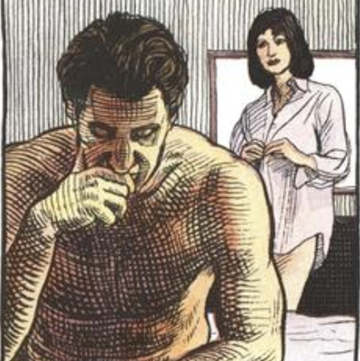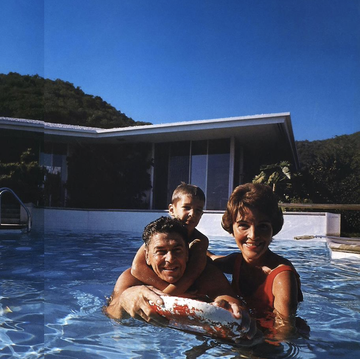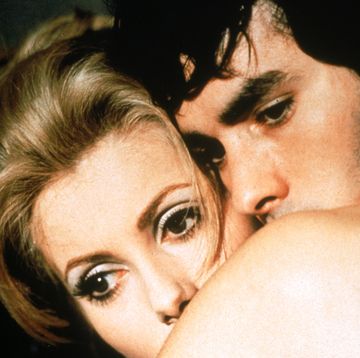F. Scott Fitzgerald's lauded reflection on fame and addiction first published as a three-part series in the February, March, and April 1936 issues of Esquire. Available in full, below, it contains an outdated and potentially offensive description of race. You can find every Esquire story ever published at Esquire Classic.
Part I: The Crack-Up
Of course all life is a process of breaking down, but the blows that do the dramatic side of the work—the big sudden blows that come, or seem to come, from outside—the ones you remember and blame things on and, in moments of weakness, tell your friends about, don't show their effect all at once. There is another sort of blow that comes from within—that you don't feel until it's too late to do anything about it, until you realize with finality that in some regard you will never be as good a man again. The first sort of breakage seems to happen quick—the second kind happens almost without your knowing it but is realized suddenly indeed.
Before I go on with this short history, let me make a general observation—the test of a first-rate intelligence is the ability to hold two opposed ideas in the mind at the same time, and still retain the ability to function. One should, for example, be able to see that things are hopeless and yet be determined to make them otherwise. This philosophy fitted on to my early adult life, when I saw the improbable, the implausible, often the "impossible," come true. Life was something you dominated if you were any good. Life yielded easily to intelligence and effort, or to what proportion could be mustered of both. It seemed a romantic business to be a successful literary man—you were not ever going to be as famous as a movie star but what note you had was probably longer-lived; you were never going to have the power of a man of strong political or religious convictions but you were certainly more independent. Of course within the practice of your trade you were forever unsatisfied—but I, for one, would not have chosen any other.
As the Twenties passed, with my own twenties marching a little ahead of them, my two juvenile regrets—at not being big enough (or good enough) to play football in college, and at not getting overseas during the war—resolved themselves into childish waking dreams of imaginary heroism that were good enough to go to sleep on in restless nights. The big problems of life seemed to solve themselves, and if the business of fixing them was difficult, it made one too tired to think of more general problems.
Life, ten years ago, was largely a personal matter. I must hold in balance the sense of futility of effort and the sense of the necessity to struggle; the conviction of the inevitability of failure and still the determination to "succeed"—and, more than these, the contradiction between the dead hand of the past and the high intentions of the future. If I could do this through the common ills—domestic, professional, and personal—then the ego would continue as an arrow shot from nothingness to nothingness with such force that only gravity would bring it to earth at last.
For seventeen years, with a year of deliberate loafing and resting out in the center—things went on like that, with a new chore only a nice prospect for the next day. I was living hard, too, but: "Up to forty-nine it'll be all right," I said. "I can count on that. For a man who's lived as I have, that's all you could ask."
—And then, ten years this side of forty-nine, I suddenly realized I had prematurely cracked.
Now a man can crack in many ways—can crack in the head, in which case the power of decision is taken from you by others; or in the body, when one can but submit to the white hospital world; or in the nerves. William Seabrook in an unsympathetic book tells, with some pride and a movie ending, of how he became a public charge. What led to his alcoholism, or was bound up with it, was a collapse of his nervous system. Though the present writer was not so entangled—having at the time not tasted so much as a glass of beer for six months —it was his nervous reflexes that were giving way—too much anger and too many tears.
Moreover, to go back to my thesis that life has a varying offensive, the realization of having cracked was not simultaneous with a blow, but with a reprieve.
Not long before, I had sat in the office of a great doctor and listened to a grave sentence. With what, in retrospect, seems some equanimity, I had gone on about my affairs in the city where I was then living, not caring much, not thinking how much had been left undone, or what would become of this and that responsibility, like people do in books; I was well insured and anyhow I had been only a mediocre caretaker of most of the things left in my hands, even of my talent.
But I had a strong sudden instinct that I must be alone. I didn't want to see any people at all. I had seen so many people all my life—I was an average mixer, but more than average in a tendency to identify myself, my ideas, my destiny, with those of all classes that came in contact with. I was always saving or being saved—in a single morning I would go through the emotions ascribable to Wellington at Waterloo. I lived in a world of inscrutable hostiles and inalienable friends and supporters.
But now I wanted to be absolutely alone and so arranged a certain insulation from ordinary cares.
It was not an unhappy time. I went away and there were fewer people. I found I was good-and-tired. I could lie around and was glad to, sleeping or dozing sometimes twenty hours a day and in the intervals trying resolutely not to think—instead I made lists—made lists and tore them up, hundreds of lists: of cavalry leaders and football players and cities, and popular tunes and pitchers, and happy times, and hobbies and houses lived in and how many suits since I left the army and how many pairs of shoes (I didn't count the suit I bought in Sorrento that shrank, nor the pumps and dress shirt and collar that I carried around for years and never wore, because the pumps got damp and grainy and the shirt and collar got yellow and starch-rotted). And lists of women I'd liked, and of the times I had let myself be snubbed by people who had not been my betters in character or ability.
—And then suddenly, surprisingly, I got better.
—And cracked like an old plate as soon as I heard the news.
That is the real end of this story. What was to be done about it will have to rest in what used to be called the "womb of time." Suffice to say that after about an hour of solitary pillow-hugging, I began to realize that for two years my life had been a drawing on resources that I did not possess, that I had been mortgaging myself physically and spiritually up to the hilt. What was the small gift of life given back in comparison to that?—when there had once been a pride of direction and a confidence in enduring independence.
I realized that in those two years, in order to preserve something—an inner hush maybe, maybe not—I had weaned myself from all the things I used to love—that every act of life from the morning toothbrush to the friend at dinner had become an effort. I saw that for a long time I had not liked people and things, but only followed the rickety old pretense of liking. I saw that even my love for those closest to me had become only an attempt to love, that my casual relations—with an editor, a tobacco seller, the child of a friend, were only what I remembered I should do, from other days. All in the same month I became bitter about such things as the sound of the radio, the advertisements in the magazines, the screech of tracks, the dead silence of the country —contemptuous at human softness, immediately (if secretively) quarrelsome toward hardness—hating the night when I couldn't sleep and hating the day because it went toward night. I slept on the heart side now because I knew that the sooner I could tire that out, even a little, the sooner would come that blessed hour of nightmare which, like a catharsis, would enable me to better meet the new day.
There were certain spots, certain faces I could look at. Like most midwesterners, I have never had any but the vaguest race prejudices—I always had a secret yen for the lovely Scandinavian blondes who sat on porches in St. Paul but hadn't emerged enough economically to be part of what was then society. They were too nice to be "chickens" and too quickly off the farmlands to seize a place in the sun, but I remember going round blocks to catch a single glimpse of shining hair—the bright shock of a girl I'd never know. This is urban, unpopular talk. It strays afield from the fact that in these latter days I couldn't stand the sight of Celts, English, Politicians, Strangers, Virginians, Negroes (light or dark), Hunting People, or retail clerks, and middlemen in general, all writers (I avoided writers carefully because they can perpetuate trouble as no one else can)—and all the classes as classes and most of them as members of their class…
Trying to cling to something, I liked doctors and girl children up to the age of about thirteen and well-brought-up boy children from about eight years old on. I could have peace and happiness with these few categories of people. I forgot to add that I liked old men—men over seventy, sometimes over sixty if their faces looked seasoned. I liked Katherine Hepburn's face on the screen, no matter what was said about her pretentiousness, and Miriam Hopkins's face, and old friends if I only saw them once a year and could remember their ghosts.
All rather inhuman and undernourished, isn't it? Well, that, children, is the true sign of cracking up.
It is not a pretty picture. Inevitably it was carted here and there within its frame and exposed to various critics. One of them can only be described as a person whose life makes other people's lives seem like death—even this time when she was cast in the unusually unappealing role of Job's comforter. In spite of the fact that this story is over, let me append our conversation as a sort of postscript:
"Instead of being so sorry for yourself, listen—"she said. (She always says "Listen," because she thinks while she talks—really thinks.) So she said: "Listen. Suppose this wasn't a crack in you—suppose it was a crack in the Grand Canyon."
"The crack's in me," I said heroically.
"Listen! The world only exists in your eyes—your conception of it. You can make it as big or as small as you want to. And you're trying to be a little puny individual. By God, if I ever cracked, I'd try to make the world crack with me. Listen! The world only exists through your apprehension of it, and so it's much better to say that it's not you that's cracked—it's the Grand Canyon."
"Baby, et up all her Spinoza?"
"I don't know anything about Spinoza. I know—" She spoke, then, of old woes of her own, that seemed, in telling, to have been more dolorous than mine, and how she had met them, overridden them, beaten them.
I felt a certain reaction to what she said, but I am a slow-thinking man, and it occurred to me simultaneously that of all natural forces, vitality is the incommunicable one. In days when juice came into one as an article without duty, one tried to distribute it—but always without success; to further mix metaphors, vitality never "takes." You have it or you haven't it, like health or brown eyes or honor or a baritone voice. I might have asked some of it from her, neatly wrapped and ready for home cooking and digestion, but I could never have got it—not if I'd waited around for a thousand hours with the tin cup of self-pity. I could walk from her door, holding myself very carefully like cracked crockery, and go away into the world of bitterness, where I was making a home with such materials as are found there—and quote to myself after I left her door:
"Ye are the salt of the earth. But if the salt hath lost its savour, wherewith shall it be salted?"
Matthew 5:13
Part II: Pasting It Together
In a previous article this writer told about his realization that what he had before him was not the dish that he had ordered for his forties. In fact—since he and the dish were one, he described himself as a cracked plate, the kind that one wonders whether it is worth preserving. Your editor thought that the article suggested too many aspects without regarding them closely, and probably many readers felt the same way—and there are always those to whom all self-revelation is contemptible, unless it ends with a noble thanks to the gods for the Unconquerable Soul.
But I had been thanking the gods too long, and thanking them for nothing. I wanted to put a lament in my record, without even the background of the Euganean Hills to give it color. There weren't any Euganean Hills that I could see.
Sometimes, though, the cracked plate has to be retained in the pantry, has to be kept in service as a household necessity. It can never again be warmed on the stove nor shuffled with the other plates in the dishpan; it will not be brought out for company, but it will do to hold crackers late at night or to go into the icebox under leftovers…
Hence this sequel—a cracked plate's further history.
Now the standard cure for one who is sunk is to consider those in actual destitution or physical suffering—this is an all-weather beatitude for gloom in general and fairly salutary daytime advice for everyone. But at three o'clock in the morning, a forgotten package has the same tragic importance as a death sentence, and the cure doesn't work—and in a real dark night of the soul it is always three o'clock in the morning, day after day. At that hour the tendency is to refuse to face things as long as possible by retiring into an infantile dream—but one is continually startled out of this by various contacts with the world. One meets these occasions as quickly and carelessly as possible and retires once more back into the dream, hoping that things will adjust themselves by some great material or spiritual bonanza. But as the withdrawal persists there is less and less chance of the bonanza—one is not waiting for the fade-out of a single sorrow, but rather being an unwilling witness of an execution, the disintegration of one's own personality…
Unless madness or drugs or drink come into it, this phase comes to a dead end, eventually, and is succeeded by a vacuous quiet. In this you can try to estimate what has been sheared away and what is left. Only when this quiet came to me did I realize that I had gone through two parallel experiences.
The first time was twenty years ago, when I left Princeton in junior year with a complaint diagnosed as malaria. It transpired, through an X-ray taken a dozen years later, that it had been tuberculosis—a mild case, and after a few months of rest I went back to college. But I had lost certain offices, the chief one was the presidency of the Triangle Club, a musical comedy idea, and also I dropped back a class. To me college would never be the same. There were to be no badges of pride, no medals, after all. It seemed on one March afternoon that I had lost every single thing I wanted—and that night was the first time that I hunted down the specter of womanhood that, for a little while, makes everything else seem unimportant.
Years later I realized that my failure as a big shot in college was all right—instead of serving on committees, I took a beating on English poetry; when I got the idea of what it was all about, I set about learning how to write. On Shaw's principle that "if you don't get what you like, you better like what you get," it was a lucky break—at the moment it was a harsh and bitter business to know that my career as a leader of men was over.
Since that day I have not been able to fire a bad servant, and I am astonished and impressed by people who can. Some old desire for personal dominance was broken and gone. Life around me was a solemn dream, and I lived on the letters I wrote to a girl in another city. A man does not recover from such jolts—he becomes a different person, and, eventually, the new person finds new things to care about.
The other episode parallel to my current situation took place after the war, when I had again overextended my flank. It was one of those tragic loves doomed for lack of money, and one day the girl closed it out on the basis of common sense. During a long summer of despair I wrote a novel instead of letters, so it came out all right, but it came out all right for a different reason. The man with the jingle of money in his pocket who married the girl a year later would always cherish an abiding distrust, an animosity, toward the leisure class—not the conviction of a revolutionist but the smoldering hatred of a peasant. In the years since then I have never been able to stop wondering where my friends' money came from, nor to stop thinking that at one time a sort of droit du seigneur might have been exercised to give one of them my girl.
For sixteen years I lived pretty much as this latter person, distrusting the rich, yet working for money with which to share their mobility and the grace that some of them brought into their lives. During this time I had plenty of the usual horses shot from under me—I remember some of their names—Punctured Pride, Thwarted Expectation, Faithless, Show-off, Hard Hit, Never Again. And after a while I wasn't twenty-five, then not even thirty-five, and nothing was quite as good. But in all these years I don't remember a moment of discouragement. I saw honest men through moods of suicidal gloom—some of them gave up and died; others adjusted themselves and went on to a larger success than mine; but my morale never sank below the level of self-disgust when I had put on some unsightly personal show. Trouble has no necessary connection with discouragement—discouragement has a germ of its own, as different from trouble as arthritis is different from a stiff joint.
When a new sky cut off the sun last spring, I didn't at first relate it to what had happened fifteen or twenty years ago. Only gradually did a certain family resemblance come through—an overextension of the flank, a burning of the candle at both ends; a call upon physical resources that I did not command, like a man overdrawing at his bank. In its impact this blow was more violent than the other two but it was the same in kind—a feeling that I was standing at twilight on a deserted range, with an empty rifle in my hands and the targets down. No problem set—simply a silence with only the sound of my own breathing.
In this silence there was a vast irresponsibility toward every obligation, a deflation of all my values. A passionate belief in order, a disregard of motives or consequences in favor or guesswork and prophecy, a feeling that craft and industry would have a place in any world—one by one, these and other convictions were swept away. I saw that the novel, which at my maturity was the strongest and supplest medium for conveying thought and emotion from one human being to another, was becoming subordinated to a mechanical and communal art that, whether in the hands of Hollywood merchants or Russian idealists, was capable of reflecting only the tritest thought, the most obvious emotion. It was an art in which words were subordinate to images, where personality was worn down to the inevitable low gear of collaboration. As long past as 1930, I had a hunch that the talkies would make even the best selling novelist as archaic as silent pictures. People still read, if only Professor Canby's book of the month—curious children nosed at the slime of Mr. Tiffany Thayer in the drugstore libraries—but there was a rankling indignity, that to me had become almost an obsession, in seeing the power of the written word subordinated to another power, a more glittering, a grosser power…
I set that down as an example of what haunted me during the long night—this was something I could neither accept nor struggle against, something which tended to make my efforts obsolescent, as the chain stores have crippled the small merchant, an exterior force, unbeatable—
(I have the sense of lecturing now, looking at a watch on the desk before me and seeing how many more minutes— )
Well, when I had reached this period of silence, I was forced into a measure that no one ever adopts voluntarily: I was impelled to think. God, was it difficult! The moving about of great secret trunks. In the first exhausted halt, I wondered whether I had ever thought. After a long time I came to these conclusions, just as I write them here:
(1) That I had done very little thinking, save within the problems of my craft. For twenty years a certain man had been my intellectual conscience. That was Edmund Wilson.
(2) That another man represented my sense of the "good life," though I saw him once in a decade, and since then he might have been hung. He is in the fur business in the Northwest and wouldn't like his name set down here. But in difficult situations I have tried to think what he would have thought, how he would have acted.
(3) That a third contemporary had been an artistic conscience to me—I had not imitated his infectious style, because my own style, such as it is, was formed before he published anything, but there was an awful pull toward him when I was on a spot.
(4) That a fourth man had come to dictate my relations with other people when these relations were successful: how to do, what to say. How to make people at least momentarily happy (in opposition to Mrs. Post's theories of how to make everyone thoroughly uncomfortable with a sort of systemized vulgarity). This always confused me and made me want to go out and get drunk, but this man had seen the game, analyzed it, and beaten it, and his word was good enough for me.
(5) That my political conscience had scarcely existed for ten years save as an element of irony in my stuff. When I became again concerned with the system I should function under, it was a man much younger than myself who brought it to me, with a mixture of passion and fresh air.
So there was not an "I" anymore—not a basis on which I could organize my self-respect—save my limitless capacity for toil that it seemed I possessed no more. It was strange to have no self—to be like a little boy left along in a big house, who knew that now he could do anything he wanted to do, but found that there was nothing that he wanted to do—
(The watch is past the hour and I have barely reached my thesis. I have some doubts as to whether this is of general interest, but if anyone wants more, there is plenty left, and your editor will tell me. If you've had enough, say so—but not too loud, because I have the feeling that someone, I'm not sure who, is sound asleep—someone who could have helped me to keep my shop open. It wasn't Lenin, and it wasn't God.)
Part III: Handle with Care
I have spoken in these pages of how an exceptionally optimistic young man experienced a crack-up of all values, a crack-up that he scarcely knew of until long after it occurred. I told of the succeeding period of desolation and of the necessity of going on, but without the benefit of Henley's familiar heroics, "my head is bloody but unbowed." For a checkup of my spiritual liabilities indicated that I had no particular head to be bowed or unbowed. Once I had had a heart but that was about all I was sure of.
This was at least a starting place out of the morass in which I floundered: "I felt—therefore I was." At one time or another there had been many people who had leaned on me, come to me in difficulties or written me from afar, believed implicitly in my advice and my attitude toward life. The dullest platitude monger or the most unscrupulous Rasputin who can influence the destinies of many people must have some individuality, so the question became one of finding why and where I had changed, where was the leak through which, unknown to myself, my enthusiasm and my vitality had been steadily and prematurely trickling away.
One harassed and despairing night I packed a briefcase and went off a thousand miles to think it over. I took a dollar room in a drab little town where I knew no one and sunk all the money I had with me in a stock of potted meat, crackers, and apples. But don't let me suggest that the change from a rather overstuffed world to a comparative asceticism was any Research Magnificent—I only wanted absolute quiet to think out why I had developed a sad attitude towards sadness, a melancholy attitude toward melancholy, and a tragic attitude toward tragedy—why I had become identified with the objects of my horror or compassion.
Does this seem a fine distraction? It isn't: identification such as this spells the death of accomplishment. It is something like this that keeps sane people from working. Lenin did not willingly endure the sufferings of his proletariat, nor Washington of his troops, nor Dickens of his London poor. And when Tolstoy tried some such merging of himself with the objects of his attention, it was a fake and a failure. I mention these because they are the men best known to us all.
It was dangerous mist. When Wordsworth decided that "there hath passed away a glory from the earth," he felt no compulsion to pass away with it, and the Fiery Particle Keats never ceased his struggle against T.B. nor in his last moments relinquished his hope of being among the English poets.
My self-immolation was something sodden-dark. It was very distinctly not modern—yet I saw it in others, saw it in a dozen men of honor and industry since the war. (I heard you, but that's too easy —there were Marxians among these men.) I had stood by while one famous contemporary of mine played with the idea of the Big Out for half a year; I had watched when another, equally eminent, spent months in an asylum unable to endure any contact with his fellowmen. And of those who had given up and passed on I could list a score.
This led me to the idea that the ones who had survived had made some sort of clean break. This is a big word and is no parallel to a jailbreak when one is probably headed for a new jail or will be forced back to the old one. The famous "Escape" or "Run away from it all" is an excursion in a trap even if the trap includes the South Seas, which are only for those who want to paint them or sail them. A clean break is something you cannot come back from; that is irretrievable because it makes the past cease to exist. So, since I could no longer fulfill the obligations that life had set for me or that I had set for myself, why not slay the empty shell who had been posturing at it for four years? I must continue to be a writer because that was my only way of life, but I would cease any attempts to be a person—to be kind, just, or generous. There were plenty of counterfeit coins around that would pass instead of these and I knew where I could get them at a nickel on the dollar. In thirty-nine years an observant eye has learned to detect where the milk is watered and the sugar is sanded, the rhinestone passed for diamond and the stucco for stone. There was to be no more giving of myself—all giving was to be outlawed henceforth under a new name, and that name was Waste.
The decision made me rather exuberant, like anything that is both real and new. As a sort of beginning there was a whole shaft of letters to be tipped into the wastebasket when I went home, letters that wanted something for nothing—to read this man's manuscript, market this man's poem, speak free on the radio, indite notes of introduction, give this interview, help with the plot of this play, with this domestic situation, perform this act of thoughtfulness or charity.
The conjurer's hat was empty. To draw things out of it had long been a sort of sleight of hand, and now, to change the metaphor, I was off the dispensing end of the relief roll forever.
The heady villainous feeling continued.
I felt like the beady-eyed men I used to see on the commuting train from Great Neck fifteen years back—men who didn't care whether the world tumbled into chaos tomorrow if it spared their houses. I was one with them now, one with the smooth articles who said:
"I'm sorry but business is business."
Or:
"You ought to have thought of that before you got into this trouble."
Or:
"I'm not the person to see about that."
And a smile—ah, I would get me a smile. I'm still working on that smile. It is to combine the best qualities of a hotel manager, an experienced old social weasel, a headmaster on visitors' day, a colored elevator man, a pansy pulling a profile, a producer getting stuff at half its market value, a trained nurse coming on a new job, a body-vender in her first rotogravure, a hopeful extra swept near the camera, a ballet dancer with an infected toe, and of course the great beam of loving kindness common to all those from Washington to Beverly Hills who must exist by virtue of the contorted pan.
The voice too—I am working with a teacher on the voice. When I have perfected it the larynx will show no ring of conviction except the conviction of the person I am talking to. Since it will be largely called upon for the elicitation of the word "Yes," my teacher (a lawyer) and I are concentrating on that, but in extra hours. I am learning to bring into it that polite acerbity that makes people feel that far from being welcome they are not even tolerated and are under continual and scathing analysis at every moment. These times will of course not coincide with the smile. This will be reserved exclusively for those from whom I have nothing to gain, old worn-out people or young struggling people. They won't mind—what the hell, they get it most of the time anyhow.
But enough. It is not a matter of levity. If you are young and you should write asking to see me and learn how to be a somber literary man writing pieces upon the state of emotional exhaustion that often overtakes writers in their prime—if you should be so young and fatuous as to do this, I would not do so much as acknowledge your letter, unless you were related to someone very rich and important indeed. And if you were dying of starvation outside my window, I would go out quickly and give you the smile and the voice (if no longer the hand) and stick around till somebody raised a nickel to phone for the ambulance, that is if I thought there would be any copy in it for me.
I have now at last become a writer only. The man I had persistently tried to be became such a burden that I have "cut him loose" with as little compunction as a Negro lady cuts loose a rival on Saturday night. Let the good people function as such—let the overworked doctors die in harness, with one week's "vacation" a year that they can devote to straightening out their family affairs, and let the underworked doctors scramble for cases at one dollar a throw; let the soldiers be killed and enter immediately into the Valhalla of their profession. That is their contract with the gods. A writer need have no such ideals unless he makes them for himself, and this one has quit. The old dream of being an entire man in the Goethe-Byron-Shaw tradition, with an opulent American touch, a sort of combination of J.P. Morgan, Topham Beauclerk, and St. Francis of Assisi, has been relegated to the junk heap of the shoulder pads word for one day on the Princeton freshman football field and the overseas cap never worn overseas.
So what? This is what I think now: that the natural state of the sentient adult is a qualified unhappiness. I think also that in an adult the desire to be finer in grain that you are, "a constant striving" (as those people say who gain their bread by saying it) only adds to this unhappiness in the end—that end that comes to our youth and hope. My own happiness in the past often approached such an ecstasy that I could not share it even with the person dearest to me but had to walk it away in quiet streets and lanes with only fragments of it to distill into little lines in books—and I think that my happiness, or talent for self-delusion or what you will, was an exception. It was not the natural thing but the unnatural—unnatural as the Boom; and my recent experience parallels the wave of despair that swept the nation when the Boom was over.
I shall manage to live with the new dispensation, though it has taken some months to be certain of the fact. And just as the laughing stoicism which has enabled the American Negro to endure the intolerable conditions of his existence has cost him his sense of the truth—so in my case there is a price to pay. I do not any longer like the postman, nor the grocer, nor the editor, nor the cousin's husband, and he in turn will come to dislike me, so that life will never be very pleasant again, and the sign Cave Canem is hung permanently just above my door. I will try to be a correct animal though, and if you throw me a bone with enough meat on it I may even lick your hand.
